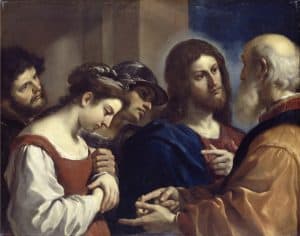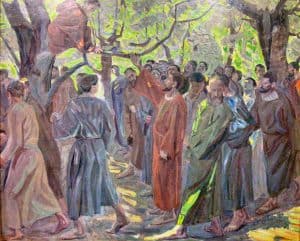An Epilogue to the Three-Part Series Titled “A Warning to Southern Baptists Against Diluting or Adding to the Gospel”
Your worst days are never so bad that you are beyond the reach of God’s grace. And your best days are never so good that you are beyond the need of God’s grace. Pharisee-type believers unconsciously think they have earned God’s blessing through their behavior. Guilt-laden believers are quite sure they have forfeited God’s blessing through their lack of discipline or their disobedience. Both have forgotten the meaning of grace because they have moved away from the gospel and have slipped into a performance relationship with God.
—Jerry Bridges—
See how ye Pharisee in the Temple stands,
And justifies himself with lifted hands.
Whilst ye poor publican with downcast eyes,
Conscious of guilt to God for mercy cries.
—John Bunyan—
Key points: Critical theory and critical race theory, along with other social justice ideologies, have infiltrated the church and are deceiving well-meaning Christians. Critical theory embraces and promotes ideas contrary to biblical teachings about humanity, sin, and salvation. In fact, it promotes a “salvation” that requires works and breeds pride and pharisaism. As we saw in our last three posts, the North American Mission Board and its church-planting SEND Network are advocating a works-oriented salvation. Here’s why: Key leaders at NAMB and SEND have accepted the social justice narrative, including critical theory, as true.
Luke 18:9-14 informs us that Jesus
9 spoke this parable to some who trusted in themselves that they were righteous, and despised others: 10 “Two men went up to the temple to pray, one a Pharisee and the other a tax collector. 11 The Pharisee stood and prayed thus with himself, ‘God, I thank You that I am not like other men—extortioners, unjust, adulterers, or even as this tax collector. 12 I fast twice a week; I give tithes of all that I possess.’ 13 And the tax collector, standing afar off, would not so much as raise his eyes to heaven, but beat his breast, saying, ‘God, be merciful to me a sinner!’ 14 I tell you, this man went down to his house justified rather than the other; for everyone who exalts himself will be humbled, and he who humbles himself will be exalted.”
Consider the irony of this parable! The Pharisee was convinced he was right with God but wasn’t. The tax collector knew and admitted he wasn’t right with God and in helplessness and shame asked God for mercy. This attitude toward God paved the way for him to be justified, or made righteous in God’s sight — despite his sin. In other words, God forgives sinners who recognize they are helpless and hopeless without Him and who confess their sins and repent.

We find similar scenario in John 8:1-11. The scribes and Pharisees brought to Jesus a woman who had been “caught in adultery, in the very act” (v. 4). They were ready to stone her, but even more than that, they wanted to trap Jesus (see v. 6). They reminded the Lord that Moses’ law says adulterers should be stoned. Did He agree with the law or not? (See v. 5.) Jesus was wise to their scheming, and, pretending not to hear, He “stooped down and wrote on the ground with His finger” (v. 6). They kept on asking, and so Jesus stood up and said, “He who is without sin among you, let him throw a stone at her first” (v. 7). Then “He stooped down and wrote on the ground” once more (v. 8). Convicted by Jesus’ words, the woman’s accusers, one by one, walked away (see v. 9).
Here was the scribes’ and the Pharisees’ problem. Thinking they had the upper hand by citing the law, they were convinced they were right with God — but pride and arrogance, as well as their many other sins, kept them far away from Him. The woman, by contrast, knew she was a sinner and surely welcomed Jesus’ merciful overture:
10 He said to her, “Woman, where are those accusers of yours? Has no one condemned you?”
11 She said, “No one, Lord.”
And Jesus said to her, “Neither do I condemn you; go and sin no more.”
The Gospel Sets Us Free
Part 2 of our series titled “A Warning to Southern Baptists Against Diluting or Adding to the Gospel” features a quote by Adrian Rogers (1931-2005). Dr. Rogers was pastor of Bellevue Baptist Church in Memphis, Tennessee for 33 years. The statements we presented highlight various contrasts between the law and the gospel, but we didn’t cite the complete quote. You can read Dr. Rogers’ statements in their entirety here.
You are not saved by keeping the law.

The law says, “Do this, and thou shalt live.” The gospel says, “live, and thou shalt do.”
The law says, “Pay me what thou owest.” The gospel says, “I freely forgive all.”
The law says, “Thou shalt love the Lord thy God with all thy soul, with all thy heart, with all thy mind” [Matt. 22:37]. The gospel says, “Herein is love, not that we loved God, but that He loved us and sent His Son to be the propitiation for our sins” [1 John 4:10]
The law says, “Cursed is every one who continueth not in all things which are written in the book of the law to do them” [Gal. 3:10]. The gospel says, “Blessed is the man whose iniquities are forgiven, and whose sins are covered” [Ps. 32:1].
The law says, “The wages of sin is death” [Rom. 6:23]. The gospel says, “The gift of God is eternal life through Jesus Christ our Lord” [Rom. 6:23].
The law demands holiness. The gospel provides holiness.
The law says, “Do!” The gospel says, “Done!”
The law places the day of rest at the end of the week. The gospel places the day of rest at the beginning of the week.
The law makes blessing the result of obedience. The gospel makes obedience the result of blessing.

The law says, “Run!” but it doesn’t give us any legs. The gospel says, “Fly!” and it give us wings.
Oh, thank God for the gospel! What the law could not do in that it was weak through the flesh, Christ, dying for sinful flesh, brought to us light and life and immortality in the gospel” [Rom. 8:3; 2 Tim. 1:10].
The contrasts between legalism and grace are very similar. Let’s consider a few of them. This list is adapted from this brief article.
Legalism demands. Grace enables.
Legalism challenges but ultimately defeats us. Grace provides victory through surrender.

Legalism points to an unattainable goal of righteousness. Grace puts us in the place of Christ’s righteousness from the start.
Legalism says, “Earn recognition.” Grace says, “Recognize what Christ has done for you.”
Legalism motivates through obligation. Grace encourages through love.
Legalism lies to us about our ability. Grace tells us the truth about our helplessness apart from Christ.
Legalism leads us to believe we’re right with God when we aren’t. Grace tells us we are alienated from the Lord but invites us to allow Him to forgive our sins and bring us into a right relationship with Him.
Legalism says, “You have to.” Grace makes us want to.
Legalism promotes pride. Grace fosters humility.

Legalism imprisons. Grace liberates.
Legalism is written in black and white. Grace is written in red—the color of Christ’s shed blood.
Legalism makes sense but doesn’t work in the real world. Grace sounds too good to be true but genuinely transforms us and enables us to face everyday challenges.
The Social Justice Movement and Critical Race Theory Exacerbate Pride and Chain Its Adherents to the Law

Folks, the social justice movement, which includes the teachings of critical race theory and intersectionality, is a legalistic religion that is deceiving Christians by cloaking itself in high-sounding, noble rhetoric. The rhetoric sounds biblical, but it actually pushes a form of legalism. As we have seen, legalism is contrary to the gospel of Christ. People are saved when they place their faith in Christ; not because of any good works they have performed. Let this sink in: Mix the social justice narrative with Christianity, and a false gospel results — one that emphasizes both faith in Christ and works as requirements for salvation.
Mix the social justice narrative with Christianity, and a false gospel results — one that emphasizes both faith in Christ and works as requirements for salvation.

During the last three posts, we have seen that this very thing has happened at the North American Mission Board (NAMB) and its church-planting ministry, the SEND Network. Church planter Kyle Whitt, who has worked with NAMB as a church planter, released a video in which he exposed NAMB’s egregious error and challenged Southern Baptists to take corrective measures.
In this follow-up post we’re exploring how and why the social justice movement (of which critical theory, critical race theory, and intersectionality are parts) can’t be mixed with Christianity without changing the teaching on how a person is saved. Listen to Joseph Backholm explain why critical theory is not biblical in this important video.
Backholm notes three contrasts between critical theory and Christianity,
-
-
- First, “critical theory offers a different view of humanity than Christianity.”
- Second, “critical theory offers a different view of sin than Christianity.”
- And finally, critical theory offers a different view of salvation than Christianity.
-

Of this last point, Backholm says this:
According to the Bible, because we are all equally guilty of sin, salvation can only be found in Jesus through repentance. Our hope is found in being forgiven of sin. Because critical theory teaches that oppressors are guilty and the oppressed are not, salvation for the oppressed is found, not through repentance, but in social liberation here and now. Their hope is only through activism. (Emphasis added.)
Because critical theory teaches that oppressors are guilty and the oppressed are not, salvation for the oppressed is found, not through repentance, but in social liberation here and now. Their hope is only through activism.
—Joseph Backholm—
Critical Theory and the North American Mission Board
Do you see it? “Their hope is only through activism.” This is why NAMB, the SEND Network, Dhati Lewis, and apparently others at NAMB and SEND as well, have fallen into the trap of adding works to salvation, effectively saying works as well as faith are necessary for a person to be saved. They have accepted critical theory as compatible with Christianity when it is totally opposed to biblical teachings.
Not only will this make “activists” prideful; it also will put everyone in a legalistic prison from which no escape is possible. Depending on the group or groups of which one is a member, he or she is doomed either to shoulder perpetual guilt or eternal victimhood. Both of these are antithetical to the gospel of Christ — good news that really does liberate.
Critical theory doesn’t just make “activists” prideful; it also condemns a person to either perpetual guilt or eternal victimhood. Both of these are antithetical to the gospel of Christ — good news that really does liberate.
The works NAMB highlights include “holistic restoration” and “The Great Requirement” (see Micah 6:8). These are seen as biblical teachings on social justice; but in Scripture, justice needs no adjectives. When works of any kind are considered necessary for salvation, people will think have something to brag about. Boasting and pride go together, and pharisaism fits right in there with them.

Works won’t save anyone. Even so, they are related to salvation in this way. Believers do good works because they have been saved and transformed from the inside out. Just look at what happened to Zacchaeus, a tax collector whose encounter with Jesus changed him forever. Works absolutely are not a requirement for salvation, but they offer evidence a person has been saved.
We Must Reject the Social Justice Narrative Altogether
While promoting a works-oriented salvation certainly is enough to make social justice activists prideful, there are numerous other things about critical theory and the social justice movement that also exacerbate pride and pharisaism. Here are three Joseph Backholm specifically mentions in the video. Each one of these teachings contradicts a biblical truth or principle. What does the Bible say against them?
-
-
- “In critical theory, the degree to which you are oppressed determines your level of moral authority. The more categories of oppression someone identifies with, the more moral authority they have.” (In an earlier post on standpoint epistemology, we pointed out the fallacies of this teaching.)
- “The more oppressed someone is the less moral responsibility they have.” (All of us are equally guilty before God.)
- “Those who aren’t part of oppressed groups (straight white men) gain moral authority by surrendering to those who have it (the oppressed). this is called being ‘woke.'” (God has absolute moral authority, and human beings, who are sinful, are obligated to recognize His authority and submit to Him.)
-
Therefore, critical theory must be rejected by Christians in general and by Southern Baptists in particular. Keep in mind the main point of this article: to demonstrate how critical theory is the source of the false teaching at NAMB that works are necessary for salvation (even if this teaching has slipped in unintentionally). This alone should be enough to compel Southern Baptists to reject it — as well as intersectionality and the entire social justice narrative.
If we don’t reject them, we don’t believe and apply the Scriptures we say we are committed to uphold.
It’s that simple — and that serious.
Copyright © 2021 by B. Nathaniel Sullivan. All rights reserved.
Unless otherwise indicated, Scripture has been taken from the New King James Version®. Copyright © 1982 by Thomas Nelson, Inc. Used by permission. All rights reserved.
top image credit: Lightstock


Be First to Comment